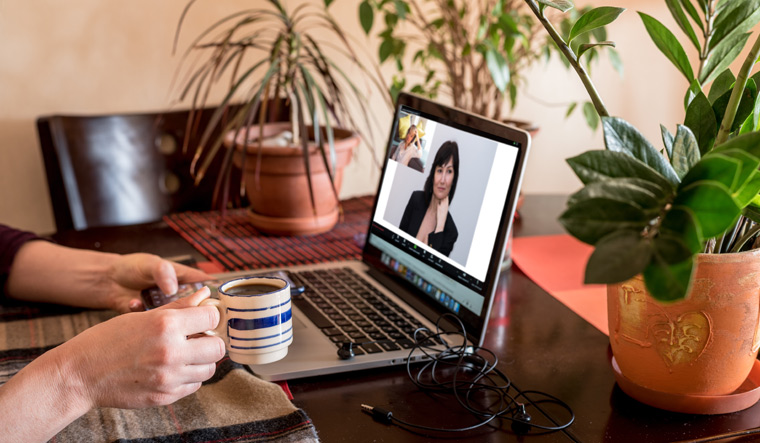When I thought of writing about adapting to a post-Covid world, I balked. I have not finished adapting to the Covid world, now I have to adjust to its aftermath?
I was just getting used to working on Zoom, even if for extended hours. Adding vodka to an innocent coffee mug, watching others stare at themselves on the screen for entire meetings and refining my lip-reading skills to the point that I could answer yes, to someone’s “am I audible” without unmuting them.
Isn’t there another wave coming that we have to brace ourselves for? Oh, there might not be? The vaccination is going strong... in spite of us.
We have been adjusting and adjusted more than the elastic on the waistband of a pair of pants on a sweaty day.
The human race currently stands suspended in that horrible place between the tickle in the nose, and the sneeze that will relieve it. My mother scoffs at me everytime I panic—“Oh Aditi, calm down This is how every generation feels.” The end is nigh, but we still have bills to pay.
1 Imagine the impossible, then execute it.
Everything that we have known to be possible about everything has been thrown to the wind. Things that were hitherto considered undoable, scoffable, or not even considered, have now become the norm.
Can you have a three-minute work commute from your bed to your laptop? Check.
Can you stay away from your local bar for more than a week? You’ve already done it!
Can you collaborate with the top artists all over the world over the internet to produce the world’s four millionth Covid-19 anthem for frontline workers when all they really want is for you to wear a mask, get paid fairly for the work they do, and get that payment on time? We will get back to you on that.
Everything is possible. If we were able to tetris a whole pandemic into our daily lives, then we sure as hell can accommodate differently abled people, kinder work practices, and things that we thought were “impossible” into our labour force executive practices.
Also read
- India restarts random Covid tests for international passengers as 4 cases of Omicron BF.7 variant detected
- Why are we vilifying Gurnam Singh Chaduni, asks Anuja Chauhan
- The pandemic is rebirthing the world in ways we don’t fully understand yet
- Pandemic might give way to an era of deglobalisation, says Shashi Tharoor
- Overshadowed by pandemic, humanity’s greatest challenges remain: Ashwin Sanghi
- Jerry Pinto's poem: Learning from the lockdown
2 Love thy family
(This refers to your biological family as well as the rag-tag group of people that become your kin when you do not have relatives around.)
Family drama is fine, but that should not turn into family fights and grudges.
Why does this grossly saccharine KJo-esque cliche make it to the list of survival tactics, you ask? The fact of the matter is that most Indian families cannot afford to have long-term fights and hold grudges against each other—we need someone we can borrow money from in case of medical emergencies. We pass down diabetes and heart disease like family heirlooms across every branch of our family trees, so we might as well be there for each other when the consequences hit. It will only prepare us for our own eventuality. It might even help us prevent it.
This must be done with healthy boundaries in order to succeed—but “healthy boundaries” has been a foreign concept to us since 1947.
3 Enjoy yourself a bit—now
I enjoy swimming, gardening, cooking, running—all things I used to avoid, because I felt guilty for having fun. I convinced myself that if I was not having fun, I was being a “hustler”, an “entrepreneur” and other terms that people have coined to gaslight ourselves into believing that we are how much money we make. Luckily this generation knows that we are not the amount of money we make, but the number of followers we have on social media. Prior to the pandemic, I spent too much time enjoying telling people that I was enjoying things. Now I do the things, and sometimes (gasp!) do not even post about it on social media. It has made my community engagement online plummet, but the people who meet me offline seem to think I am having a blast, and I do not even have to tell them.
Take more pictures though, for yourself. You will need something to look back and marvel years later—“I was so pretty then, why did I think I was hideous?” and other regrets.
4 Pay attention to the small things
Because the larger ones are mostly falling apart.
Humanity at this current time is hyper aware of the multiple swords hanging over its neck—global warming, religious fundamentalism, institutional inequality, and rampant misinformation, to name a few. Act like none of it exists for 20 minutes a day by focusing on something small—the twinkle in the eyes of a smiling child, a butterfly on a flower, your bank balance.
You might argue that focusing on the smaller things and ignoring the larger ones is how we got here in the first place, but it also makes sure we do not get overwhelmed by the bigger things. From what I hear, this happens to every generation of humanity.
Mittal is a stand-up comedian, writer and actor.



